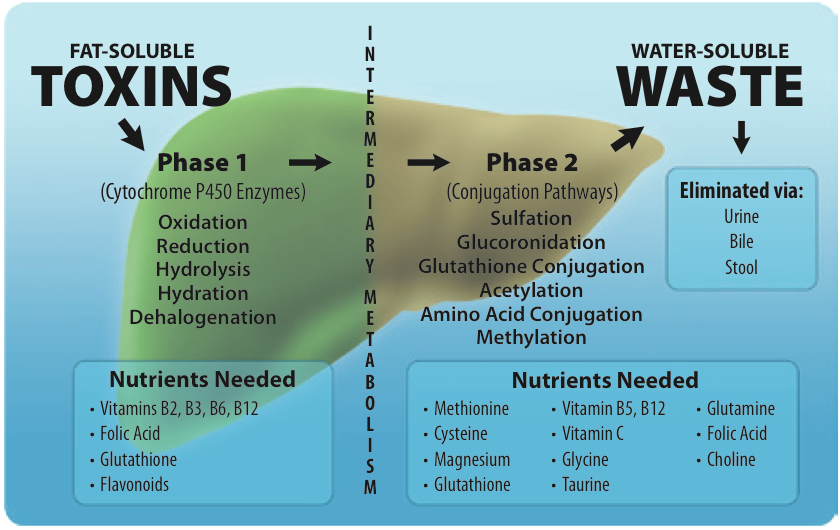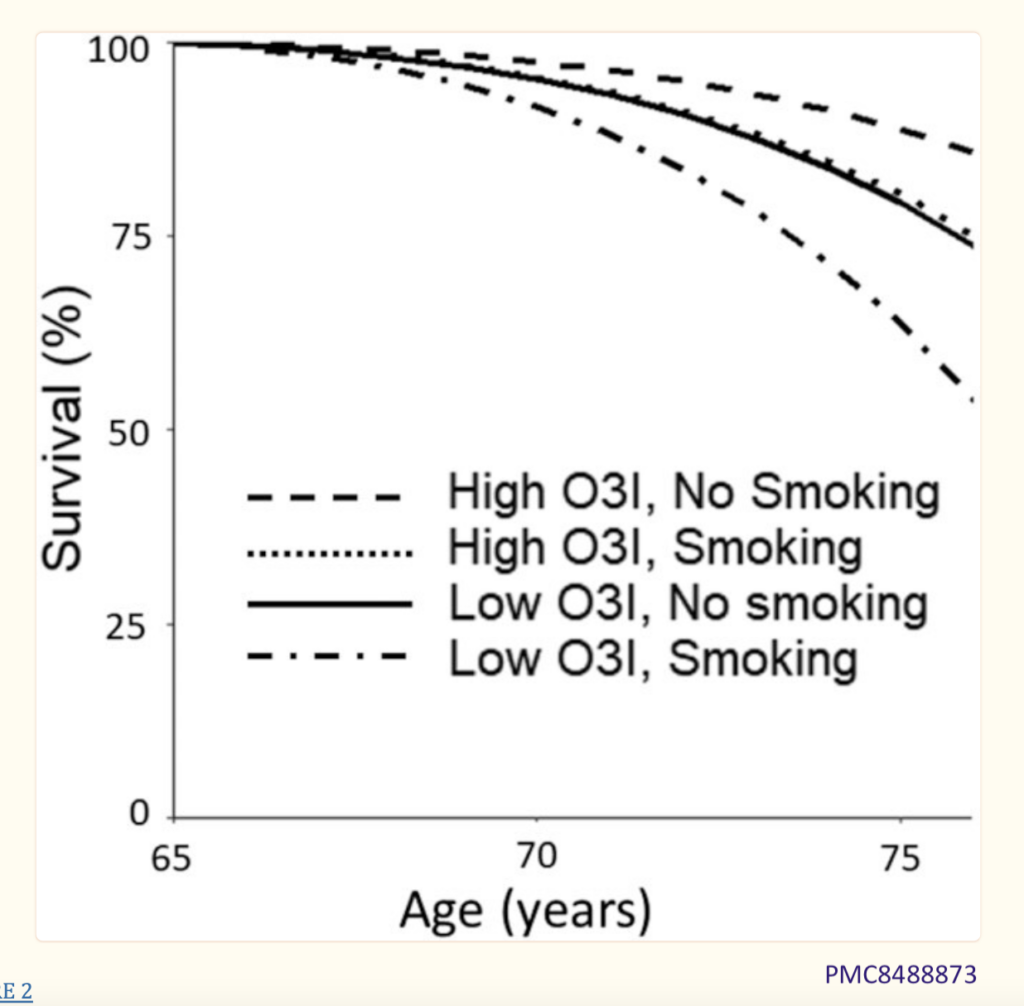
Secure Ordering | Free Shipping | 20% Off Retail Prices
Along with providing information on whether supplements to stop smoking might be right for you, this article also links to Fullscript where you can buy stop smoking supplements online through the secure healthcare formulary and get free shipping and 20% off the retail price of professional-grade supplements.
For people who smoke, quitting smoking is the ultimate goal, but the journey can be challenging. In this article, we will explore a complementary approach that involves the use of dietary supplements to reduce some of the harm caused by smoking. Omega-3, NAC, Vitamin D, Magnesium and healthy food choices can reduce the harm of smoking and reduce the cravings while you are path to quitting.
Need for Detoxification
It’s no secret that cigarette smoke contains a complex mixture of cancer-causing substances and numerous toxic chemicals. When a person inhales these compounds, their body’s ability or lack of ability to detoxify and eliminate them plays a key role in determining how harmful they are.
The detoxification process primarily occurs in the liver, where these toxins are metabolized and prepared for elimination. If the liver’s detoxification pathways are compromised because of factors like nutrient deficiencies, smoking can overwhelm this detoxification system. This leads to more oxidative stress, cellular damage, and a higher risk of developing cancer, lung disease (COPD), and cardiovascular disease.
The toxins in smoke can poison every cell directly at the level of the energy production machinery itself, the mitochondria. [PMID: 36646379] The result is fatigue. Quitting smoking is the best way to stop the toxins. But until that happens, supporting the body’s detoxification mechanisms through eating healthy foods and specific nutrient supplements can play a critical role in reducing disease risk and improving overall energy.
Your Liver Will Automatically Detox Your Body (But Only When Given The Right Nutrients)
Detox is poo-hoo’d by many, even those in healthcare. The mantra seems to be that your liver will take care of detox, so don’t worry about it. Detox also has this bad name because of the many charlatans selling diarrhea-inducing high-priced supplements that don’t address anything to do with toxins.
Here’s the real story, and it is eye-opening. Although there is a tremendous amount of stuff going on in the image below, here’s what you want to know.
Your liver won’t detoxify anything efficiently unless it has the right nutrients. In the detoxification process, the liver has two main phases:
- Phase 1: During this phase, enzymes in the liver start the process of breaking down toxic substances. Some key nutrients involved in Phase 1 detoxification include:
- B Vitamins: Vitamins such as B2 (riboflavin), B3 (niacin), B6 (pyridoxine), and B12 (cobalamin) are essential for the proper functioning of enzymes involved in Phase 1 detoxification.
- Vitamin C: Vitamin C acts as an antioxidant and can help protect liver cells from damage caused by free radicals generated during Phase 1 detoxification.
- Phase 2: In this phase, the liver further processes the partially metabolized toxins from Phase 1 to make them water-soluble and easier to excrete from the body. Key nutrients involved in Phase 2 detoxification include:
- Glutathione: This is a powerful antioxidant and detoxifier. It is made up of amino acids, primarily cysteine, and can be influenced by dietary protein intake. To synthesize glutathione the body requires amino acids like cysteine (NAC), as well as sulfur compounds, glycine, and other cofactors including as magnesium and selenium.
- Amino Acids: Amino acids such as glycine, taurine, and glutamine are essential for conjugation reactions in Phase 2 detoxification.
- Sulfur Compounds: Sulfur-containing compounds, including methionine and cysteine, are necessary for the synthesis of glutathione, which is vital for Phase 2 detoxification.
- Magnesium: Magnesium is a cofactor for several enzymes involved in Phase 2 detoxification reactions.
- Antioxidants: Antioxidants like Selenium and Vitamin E can support the detoxification process by protecting against oxidative stress.
The “Standard American Diet” does not provide adequate nutrients to carry out detoxification processes.
- Fiber: There is not enough fiber to bind bile acids and toxins to take them out of the body through the digestive tract.
- Water: There’s not enough water to make optimal quantities of urine needed excrete waste compounds.
- B Vitamins: The B vitamins required for these reactions are used up by stress, alcohol consumption, a high-sugar diet, pregnancy and lactation, certain medications, age, physical activity, and smoking.
- Magnesium: More than half the population is failing to get adequate magnesium to support Phase 2 Detoxification.
- Weed Killer: Glyphosate slows down Phase 1 detoxification by inhibiting the cytochrome P450 enzymes. Non-organic wheat, soy, and produce are covered with glyphosate. Researchers say: “Glyphosate’s inhibition of cytochrome P450 (CYP) enzymes is an overlooked component of its toxicity”. Bread is specifically high in glyphosate due to farmers spraying glyphosate directly on wheat to dry it out days before harvest.
Your liver begins detoxifying by first turning toxins into substances that are even more toxic. Once Phase 1 is complete, there’s a possibility that Phase 2 detoxification moves more slowly than Phase 1, allowing toxic intermediary compounds to build up.

Vitamin D
Vitamin D deficiency has been associated with various health problems. A placebo-controlled study of 60 people who smoked looked at the impact of vitamin D deficiency and the effect of supplementing Vitamin D at 50,000 IU/week for 24 weeks. (A typical prescription dose for Vitamin D for people with deficiency is 50,000 IU/week for 8 weeks.)
Results showed an improvement in mental health in the vitamin D group. They reported fewer symptoms of depression, which is a significant concern for many smokers. Additionally, the study showed improvement in blood sugar and insulin levels as well as improved antioxidant. Better antioxidant capacity in the vitamin D group means that their bodies were better equipped to combat oxidative stress, a crucial factor in people who smoke. [PMC8497833]
Another Study looked at how vitamin D and smoking affect lung health. Vitamin D has properties that can help the immune system and reduce inflammation, which might be important for lung function.
Here’s what they did: They studied 626 men over 20 years, measuring their vitamin D levels and checking their lung function through tests. In the group as a whole, vitamin D levels didn’t seem to directly affect lung function or how it changed over time. However, when they looked only at the current smokers in the group who had low vitamin D levels, they found their lung function was worse compared to those with enough vitamin D. Also, smokers with low vitamin D seemed to lose lung function faster as they smoked more over the years.
So, what does this mean? It suggests that having enough vitamin D might help protect your lungs from some of the harm caused by smoking. [PMC3480523]
Antioxidants
Smoking causes inflammation. It disrupts the body’s natural balance between protective antioxidants and harmful free radicals (oxidants). People who smoke often have high levels of oxidative stress and inflammation. This oxidative stress is particularly hard on the lungs.
Smokers may find benefits in the consumption of antioxidant supplements or eating high-antioxidant foods such as fruits and vegetables. These antioxidants can counteract smoking’s detrimental effects and reduce oxidative stress.
Eating a diet abundant in fruits and vegetables can be a cost-effective approach for smokers to decrease their susceptibility to smoking-related diseases and maintain better health over time. Getting antioxidants from natural sources like fruits and vegetables is more effective than taking isolated antioxidant supplements in high quantities. [PMID: 33926594]
The health benefits attributable to the intake of antioxidants have been observed predominantly when these have been consumed within their natural food [sources] in an optimal antioxidant-rich diet, while these preventive effects are rarely achieved with the intake of individual antioxidants, even at high doses.
Antioxidants in smokers [PMID: 33926594]
Omega 3 Research
Mortality Risk
In a noteworthy study, it was revealed that smokers who maintained high Omega-3 Index levels had mortality rates comparable to non-smokers. This significant finding underscores the potential of omega-3 fatty acids in reducing the health risks typically associated with smoking.
By maintaining higher levels of omega-3s, smokers might effectively reduce their overall risk of premature death to levels similar to those who do not smoke. [PMC8488873]
In another study with 2,500 participants, higher levels of omega-3 fatty acids in red blood cells (the Omega-3 Index) were linked to lower risks of mortality and cardiovascular disease (CVD) events. Over about 7 years, those with higher Omega-3 Index levels were about one-third less likely to die. This association was particularly strong for DHA, suggesting that maintaining higher levels of certain omega-3s could be key in reducing health risks, including for those at higher risk such as smokers. [PMC6034629]
Nicotine Cravings
Smoking significantly impacts health, particularly by inducing oxidative stress, which can lower omega-3 fatty acid levels in the body. This reduction is linked to impaired brain function related to addiction and craving.
In a study involving heavy-smoker males, the impact of omega-3 fatty acid supplementation on reducing cigarette cravings and oxidative stress was investigated. Participants, all smoking 20 or more cigarettes per day, were divided into two groups: one received high-dose omega-3 supplements (5 grams of fish oil with 1500 mg EPA and DHA), and the other received a placebo. Over three months, the omega-3 group showed decreases in nicotine dependence, cigarette cravings, and daily cigarette consumption, along with a reduction in oxidative stress markers. Statistically, the chances were only one in 1000 that these results could have arisen by chance. These results suggest the potential effectiveness of omega-3 fatty acids in helping heavy smokers reduce smoking behavior and oxidative stress. [*]
Supplements That Will Help You Quit Smoking
Several dietary supplements have been studied for their potential to aid in smoking cessation, although their effectiveness can vary from person to person. Some of these supplements include:
- N-Acetylcysteine (NAC): NAC is a supplement that can help replenish glutathione, an antioxidant that may be reduced by smoking. Some studies suggest that NAC may reduce cravings for cigarettes. A blinded study conducted in a smoking cessation program showed that 47% of those treated with 3 grams/day of NAC were able to quit versus 21% of placebo-treated patients. NAC also reduced depression scores these patients. [PMC6837411]
- Magnesium: Magnesium supplements may help with relaxation and stress management, which can be beneficial during the quitting process. A blinded study found magnesium/B6 supplements reduced the number of cigarettes smoked. [PMID: 15724865] Magnesium’s importance in the treatment of addictions has been described. [NBK507260]
- Omega-3 Fish Oil: High dose fish oil reduces nicotine cravings as described in the study above [*].
To quit smoking successfully, you’ll need more than supplements and healthy eating. Behavioral counseling, support groups, and mindfulness techniques can be valuable tools. Nicotine replacement therapy (NRT) and prescription medications help manage cravings and withdrawal symptoms. Identifying triggers and setting a quit date provide structure. Adopt a healthier lifestyle with exercise and a balanced diet to manage weight gain and improve well-being. Celebrate milestones, share your goal with loved ones for support, and remember that relapses can happen—use them as learning opportunities. Quitting smoking is a challenging process, but persistence and seeking help when needed are key to success.

When you purchase linked products presented on this page, Supplement Sciences, LLC receives affiliate fees so that our dietitians can continue to create great content.
Thank you for your support!
Order Supplements for People Who Smoke
Why Professionals Choose the Fullscript Formulary
Your health is on the line. Health professionals know that many other online and retail options set a very low bar for quality–sometimes amazingly low. The Fullscript formulary is the most secure online source for the highest quality brands securely sourced to assure freshness and purity. Here’s what makes Fullscript the best:
- Meticulous vetting of brand quality. Health professionals trust Fullscript to continuously monitor the quality of each item on the platform. Other retailers operate with profit as their highest or only motive when choosing brands. Fullscript cares only about quality and reliability. Unlike discount stores, large online marketplaces, and other retailers you won’t find ingredients sourced from China or other questionable locations or companies.
- Always 20% Discount off the manufacturer’s retail price. When you follow any link from Supplement-Sciences.com, you will automatically get 20% off the retail price.
- Free shipping over $50.
- Freshness. Fullscript prioritizes freshness over bulk buying even if it means an increased risk of briefly being out of stock.
- Top quality phone and online support. When you call, knowledgeable humans at Fullscript answer your questions.
- How It Works:
- Easy Sign-up & No Spam Email: Click the “View Product” button below to be taken to Fullscript’s login page where you can quickly create your secure account with just your name, email, and phone number. Then you will be taken directly to the product page.
- Wide variety of supplement options: Once you sign in to your account, you are not limited to the products listed below. You will see similar items listed at the bottom of each product page on Fullscript.
- Search For What You Want: Once inside Fullscript, you can search for the exact brands and products you want from their wide selection of quality brands.
Supplement Protocol for People Who Smoke
This supplement protocol is designed to include the nutrients that have been proven to reduce the harmful health effects of smoking and reduce cravings for nicotine. The health benefits and details about each of these individual supplements is covered in the supplement posts linked below:
- NAC (N-Acetyl Cysteine): Craving reduction and Detoxification
- Omega 3 Fish Oil: Craving Reduction and Reduced Mortality Rate
- Vitamin D3/K2: Lung Protection
- Magnesium: Craving Reduction and Detoxification
- Multivitamin: Detoxification
Beyond Supplements When You’re Trying to Quit
Although these supplements can help you reduce the health risks related to smoking and cut your cravings as you work on quitting, you’ll need all the help you can get. Talk to your physician about medications that can help. Nicotine Replacement Patches (Amazon Affiliate Link) can help with cravings during the early phase of quitting. Nicotine Gum (Amazon Affiliate Link) can be a critical tool when the cravings kick in and you find yourself at that critical point on the edge of relapse. Smoking cessation programs are proven to help. Check out all the quitting resources available from the American Lung Association.
To Sum It Up
Quitting smoking is a challenging journey, but the benefits are immeasurable. In this article, we covered the surprising effectiveness of nutritional supplements such as Omega-3 fatty acids, N-Acetylcysteine (NAC), magnesium, and vitamin D to help reduce the harm caused by smoking and to cut those relentless cravings. These supplements can be valuable allies in your quest to quit smoking, helping to combat oxidative stress, boost mood, and support overall health. Discover how incorporating these supplements can be a vital part of your strategy to break free from smoking and embrace a healthier, smoke-free future.
This Article is Not a Substitute for Medical Advice
Dietary supplements are not designed to diagnose, treat, cure, or prevent any disease. The Supplement Sciences website seeks to provide comprehensive access to the most relevant supplement information along with convenient online ordering. We do not provide medical advice and cannot guarantee that every product suggested is completely without risk. Since each person is unique in their health history and medication use, it is important to discuss supplements with your personal physician. Specifically, pregnant women and individuals being treated for cancer or liver or kidney problems must consult their physician about every nutritional supplement they plan to take. People taking medications for the treatment of HIV or with a history of organ transplant must not take supplements without consulting with their physician.

 Scan Me!
Scan Me!


